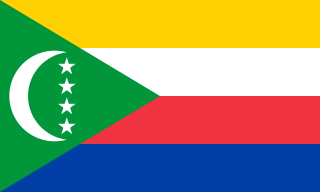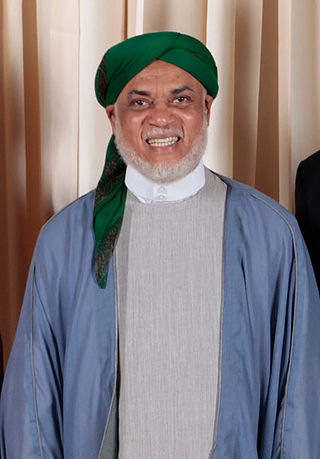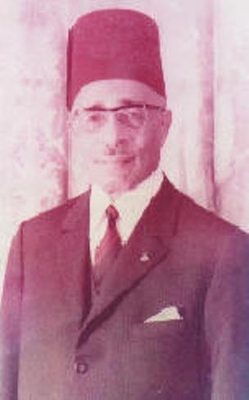Related Research Articles

The Comoros, officially the Union of the Comoros, is an archipelagic country made up of three islands in Southeastern Africa, located at the northern end of the Mozambique Channel in the Indian Ocean. Its capital and largest city is Moroni. The religion of the majority of the population, and the official state religion, is Sunni Islam. Comoros proclaimed its independence from France on 6 July 1975. The Comoros is the only country of the Arab League which is entirely in the Southern Hemisphere. It is a member state of the African Union, the Organisation internationale de la Francophonie, the Organisation of Islamic Co-operation, and the Indian Ocean Commission. The country has three official languages: Shikomori, French and Arabic.

Azali Assoumani is a Comorian politician and military officer who has served as the President of the Comoros from 2002 to 2006 and again since 2016, except for a brief period in 2019. He became head of state after staging a coup d'état in 1999 and was elected president in 2002, 2016, 2019 and 2024. He also served as Chairperson of the African Union February 2023 to February 2024.
Colonel Mohamed Bacar is a Comorian former politician who was President of Anjouan, one of the three autonomous islands that make up the Union of the Comoros, from 2001 to 2008. He is a former chief of police on Anjouan and has studied extensively in France and the United States. He was part of a military coup on Anjouan in August 2001 and soon became President. It is alleged he rigged the elections to become the first president of Anjouan in March 2002, in part due to his leading role in the separatist movement. He was ousted by the combined forces of the Government of the Union of Comoros and the African Union in the March 2008 invasion of Anjouan.
The franc is the official currency of Comoros. It is nominally subdivided into 100 centimes, although no centime denominations have ever been issued.

The unicameral Assembly of the Union of the Comoros is the country's legislative body. It was established in 2004.

Sayyid Ahmed Abdallah Mohamed Sambi is a Comorian Islamic leader and politician, and former President of Comoros. He is popularly known as 'Ayatollah'. After easily winning the 14 May 2006 presidential election with 58.02% of the national vote, Sambi was inaugurated as President of the Union of the Comoros on 26 May 2006. It was the first peaceful transfer of power in the history of the Comoros.

Prince Said Ibrahim Ben Sultan Said Ali El Maceli Al Ba'alawi was a Comorian politician. He served as a member of the French National Assembly from 1959 until 1970, and as Prime Minister of the Comoros from 2 April 1970 until 16 July 1972. He was the son of Sultan Said Ali Bin Sultan Said Omar, Sultan of Grande Comore.

The invasion of Anjouan, on March 25, 2008, was an amphibious assault led by the Comoros, backed by African Union (AU) forces, including troops from Sudan, Tanzania, Senegal, along with logistical support from Libya and France. The objective of the invasion was to topple Colonel Mohamed Bacar's leadership in Anjouan, an island in the Union of Comoros, when he refused to step down after a disputed 2007 election, in defiance of the federal government and the AU. The Comoros archipelago in the Indian Ocean has had a fractious history since its independence from France in 1975, experiencing more than 20 coups or attempted coups.

Presidential elections were held in the Comoros on 7 November 2010, with a second round on 26 December, alongside gubernatorial elections for the three main islands. The result was a victory for Ikililou Dhoinine, who received 61% of the vote.

Ikililou Dhoinine is a Comorian politician who was the President of the Comoros from 2011 to 2016; he was a Vice-President of Comoros from 2006 to 2011.

The official languages of the Comoros are Comorian, French and Arabic, as recognized under its 2001 constitution. Although each language holds equal recognition under the constitution, language use varies across Comorian society. Unofficial minority languages such as Malagasy and Swahili are also present on the island with limited usage. According to Harriet Joseph Ottenheimer, a professor of anthropology at Kansas State university, the linguistic diversity of the Comoros is the result of its rich history as part of the Indian maritime trade routes and its periods of Malagasy and French colonial rule.
Harimia Ahmed is a Comorian lawyer. The first female lawyer in the country, she has served as Minister of Justice and president of the bar council. Ahmed acted as defense counsel for high-profile clients in the islands' courts.

Parliamentary elections were held in the Comoros on 19 January 2020; in constituencies where no candidate received a majority, a second round was held alongside local elections on 23 February. The elections were boycotted by the main opposition parties, including the two largest parties in the outgoing Assembly, the Union for the Development of the Comoros and Juwa Party, in protest at constitutional reform and political repression, The result was a landslide victory for President Azali Assoumani's Convention for the Renewal of the Comoros, which won 20 of the 24 elected seats.
Said Ali Kemal was a Comorian politician. He was the son of Prince Saïd Ibrahim Ben Ali and the grandson of Sultan Said Ali bin Said Omar of Grande Comore.
Zéna M'Déré was a Mayotte woman best known as the leader of the Chatouilleuses, a movement of women who fought to maintain Mayotte's status as a French overseas department rather than joining Comoros in declaring independence, notably through the use of tickle torture on political leaders.
Capital punishment is a legal penalty in the Comoros. Currently, however, the country has a de facto moratorium in place; although the death penalty remains in the nation's penal code, it has not been used since the 1990s.

The Comoros passport sales scandal is a corruption, public funds embezzlement, bribery, and money laundering scheme in connection with a citizenship by investment program launched by the government of the Comoros Islands. Proceeds from the program were intended to finance development in the country but were instead embezzled by the perpetrators of the scheme, which include Syrian fugitive businessman Bashar Kiwan and two former Comorian Presidents.
Mohamed Ali Soilihi is a Comorian politician from Grande Comore who served as Vice-President of Union of the Comoros for Ministry of Finance, Budget, Foreign Trade and Economy of Comoros. He served in the cabinet of Ikililou Dhoinine from May 2011 to May 2016.

Corruption in the Comoros follows the familiar patterns of state-based corruption, namely government officials abusing their political powers for private gain in the country of Comoros.
References
- ↑ "Qui est Djaffar Ahmed Saïd?".
- ↑ "Vice-Présidence en charge du Ministère de l'Economie, du Plan, de l'Energie, de l'Industrie, de l'Artisanat, du Tourisme, des Investissements | Gouvernement de l'Union des Comores". 12 January 2020. Archived from the original on 2020-01-12.
- ↑ "EIUCountry Login". country.eiu.com. Retrieved 2017-01-05.
- ↑ Ali Amir Ahmed (9 September 2018). "Comoros Seeks to Arrest Ex-VP Who Opposed President's Term Limit Move | World News | US News". Archived from the original on 12 January 2020.
- ↑ Faïza Soulé Youssouf (12 September 2018). "Comoros Asks Tanzania to Extradite Ex-Vice President Over Plot". Bloomberg. Archived from the original on 24 January 2024.
- 1 2 Moussa, Mariata (3 December 2021). "Djaffar Ahmed Said I L'ancien vice-président de retour après trois années à l'étranger" (in French). Al-watwan. Archived from the original on 6 December 2021.
- 1 2 "Comorian President pardons 17 jailed opponents". africanews.com. 9 December 2019. Archived from the original on 3 October 2023.